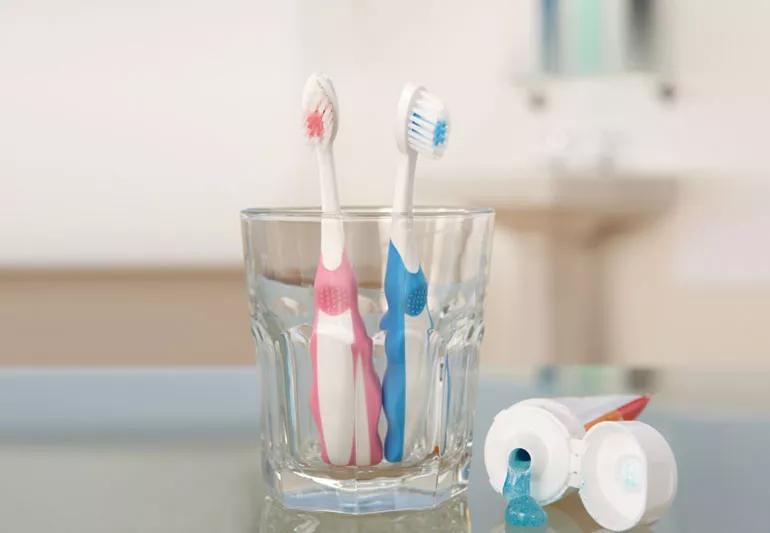Find out which viruses and bacteria can become someone else's problem

Image content: This image is available to view online.
View image online (https://assets.clevelandclinic.org/transform/22578878-eb61-49c3-9256-0063eedd47f3/salivaGerms-136222554-770x533-1_jpg)
Toothbrushes in close proximity
Your mouth is home to hundreds of different microorganisms. What happens when you’re exposed to someone else’s saliva?
Advertisement
Cleveland Clinic is a non-profit academic medical center. Advertising on our site helps support our mission. We do not endorse non-Cleveland Clinic products or services. Policy
There are ways in which saliva can serve as an important defense for our bodies, says Michael Benninger, MD. “Saliva has antibodies and enzymes that decrease the risk of contagions.”
Still, there are plenty of ways to transmit certain illnesses via saliva, an issue that’s getting new attention thanks to the outbreak of the novel COVID-19 coronavirus.
Saliva is a large focus on helping prevent the spread of coronavirus. “There is clearly coronavirus in saliva,” says Dr. Benninger, “so anything like sharing food is a high-risk contact and should be avoided.”
Here are a few other illnesses which can work their way from your saliva into your nose, throat and lungs:
Other new viruses, such as ebola virus and bird flu, are also a concern. Dr. Benninger says. Contrary to popular belief, however, the AIDS virus (human immunodeficiency virus, or HIV) is not transmitted through saliva.
Here are four ways you can accidentally transmit infection through saliva.
It’s easy to exchange infectious organisms during a kiss through your saliva. They can find their way from your mouth into your throat and lungs. (That’s why mono is called the “kissing disease.”)
Advertisement
That’s what’s particularly important to keep physical safeguards in mind during the COVID-19 outbreak. “If someone’s a health care worker and they may have had exposure to the coronavirus, they should even avoid kissing their spouse,” says Dr. Benninger.
Other viruses, like colds and flu, can also be spread by kissing, although cold viruses usually spread by touching a contaminated surface and then your nose, says Dr. Benninger.
Your saliva typically protects you against bacteria in your partner’s saliva. (There will be more bacteria when oral hygiene is poor.) But one bacteria that can be transmitted is MRSA, the serious staph infection.
Also, if you have a cold sore, kissing someone can spread the herpes 1 virus. “Despite this, there is lots of kissing going on, and very few infections,” says Dr. Benninger.
While most people don’t think of saliva when they think of sneezing, it’s actually an important component especially in these days of social distancing.
When a person sneezes, the sudden, powerful expulsion of air can propel mucous droplets at rates of up to 100 miles per hour. Likewise, saliva droplets can also be propelled several feet away. If you’re far enough away, Dr. Benninger notes, those virus-carrying droplets drop to the ground.
But if you’re close enough to someone sneezing, it’s possible to get hit with those saliva droplets and expose yourself to the virus or another potential illness. It’s one reason why health professionals have recommended staying at least six feet away from others during the coronavirus outbreak.
Dr. Benninger notes it’s also one of the reasons why it’s so important to follow proper coughing and sneezing etiquette by covering your mouth.
Ever forget a toothbrush and borrow your partner’s? The American Dental Association advises against this practice.
“Toothbrushes may cause microtrauma. Someone else’s saliva can come in contact with tears in your mucous membrane and transmit infection,” explains Dr. Benninger.
Sharing toothbrushes is especially risky if you have a weakened immune system.
Have a cold, sore throat or other virus? Keep your toothbrush from touching the family toothpaste and others’ toothbrushes.
There are also several types of mouthguards — those that protect your teeth, mouth and jaw during sports, and help keep you from grinding your teeth at night.
You can get stock mouthguards from a sporting goods store, “bite and boil” mouthguards from a drugstore, or custom-made mouthguards from your dentist.
Advertisement
Whatever type you use, mouthguards, which are porous, should never be shared. A 2007 study, reported in General Dentistry, found that mouthguards harbor bacteria, yeasts and molds.
“Someone else’s mouthguard may fit very poorly and cause microtrauma,” says Dr. Benninger. This can expose your mucous membranes to infection.
If you wear a mouthguard, be sure to:
Now, more than ever, it’s important to be smart about saliva and who you might be sharing it with. While it’s important to remember that “saliva has some wonderful things in it that helps protect us,” according to Dr. Benninger, it can also spread this new, challenging infectious disease.
“Saliva is important for our teeth, it’s important for so many things,” he adds, “but at the same time, it’s also potentially contagious.”
Advertisement

Sign up for our Health Essentials emails for expert guidance on nutrition, fitness, sleep, skin care and more.
Learn more about our editorial process.
Advertisement
Benefits typically include bi-annual screenings and lower payments on procedures like fillings and crowns
Once you see that first tooth, it’s time to start brushing
Your teeth and gums have a huge role to play in other, more systemic health conditions
Oil pulling can help prevent plaque and preserve your gums, but it can’t cure ailments
Estrogen and progesterone changes throughout the month — and throughout your life — can make you more prone to dental health concerns
Sneezing, coughing and clear mucus shouldn’t be ignored
ACHOO syndrome is your trigeminal nerve’s exaggerated response to bright light
This tool is an add-on to your regular brushing and flossing habits, not a replacement for them
Type 2 diabetes isn’t inevitable with these dietary changes
Applying a hot or cold compress can help with pain
Pump up your iron intake with foods like tuna, tofu and turkey